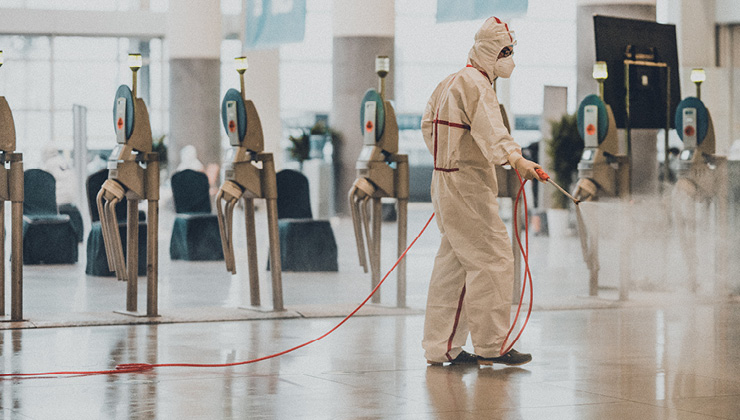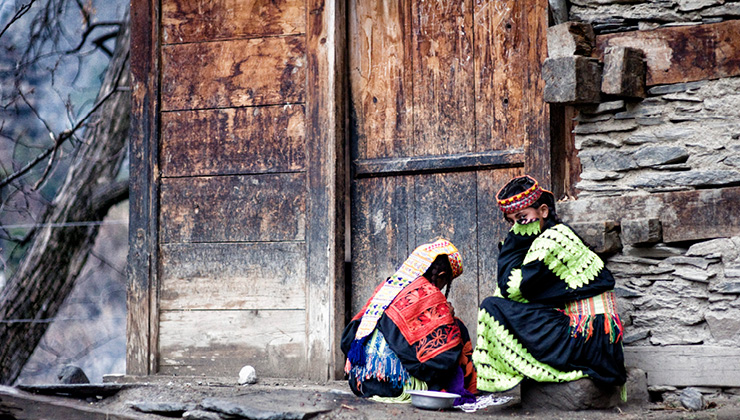Since the pandemic began the language used has been one of war where militarism has been the default position in our response. Christine Chinkin and Madeleine Rees tell us why we must seek an alternative to this militarised thinking, and why now is the time to challenge the current system of power and patriarchy, to revive the women, peace and security agenda, and set a post-pandemic framework based on wellbeing not political gain.
The language of war and combat has been engaged by leaders and commentators in the US and UK in response to the pandemic caused by the global spread of coronavirus; we hear for instance of being in a ‘fight’ or ‘battle’, medical personnel and carers forming the ‘frontline’ against an ‘invisible enemy’ and in England the ‘Dunkirk spirit’ is invoked. Militarism is always the default position. We have had the ‘war on drugs’, the ‘war on terror’ and now the war on a virus. By invoking the language of war there is a deliberate intent to pretend that ‘we are all in this together’, to get us to line up behind our ‘fearless’ leaders (male) who hold power and not to seek answers to our questions until we have ‘beaten’ this enemy.
Acknowledgment is given to the service of the caregivers (more than 70% female worldwide) who do the work, in the health services, in the care homes, at the checkouts, in their own homes, but don’t make the decisions, or are even consulted as to the decisions. On his first day back at work, the Prime Minister of the UK, Boris Johnson, commended the British people for their ‘effort and sacrifice’ such as is expected from the population in conflict.
By invoking the language of war there is a deliberate intent to pretend that ‘we are all in this together’, to get us to line up behind our ‘fearless’ leaders (male) who hold power and not to seek answers to our questions until we have ‘beaten’ this enemy
This militarism is dependent on the elevation of a particular construction of masculinity which necessitates a binary notion of gender. It is dangerous; war requires loyalty, deepens gendered divisions and sets in place a framework which, even before the curve is flattened, establishes what the post-pandemic priorities will be, unless alternatives become established policy now. Using the language of war buys governments time with their constituents, but what happens next?
We fear that militaristic thinking is so deeply rooted in the social and political institutions and in those who occupy the spaces of power within them, that pursuing rational alternatives in times of crisis and their aftermath is to seek a revolution in mindset. This has been sought through decades of feminist activism and we should acknowledge the real risk that just as conflict always reduces access to human rights, so too will inequalities be further heightened under cover of ‘recovery’.
We suggest an approach that if taken seriously could redress this: the language of conflict also brings the pandemic within the terms of the women, peace and security (WPS) agenda, which seeks to bring women’s experiences and expertise into policy and decision-making about conflict and post-conflict, grounded in human rights, gender equality and social justice.
WPS was campaigned for as a transformative feminist agenda but ownership was seized from civil society almost from its inception when disarmament was excluded from the discussions around Security Council resolution 1325 (2000) and emphasis placed on simply including women in the existing structures rather recognising those structures as central causes of conflict and seeking to change them.
This militarism is dependent on the elevation of a particular construction of masculinity which necessitates a binary notion of gender
The pandemic provides us with an opportunity of reviving the WPS agenda to see what it could and should look like. The situation as we move forward will resemble post-conflict transitions and attention should be given now to what so often goes wrong in relief and reconstruction. Knowing that most peace agreements fail, both in terms of further outbreaks of violence and of worsening existing inequalities, gives an added impetus to ensuring that the post-pandemic situation – in particular the political economy – doesn’t also fail.
The fault lines have been exposed and we see clearly those who have been hurt most, not just because of the virus but also through the social structures in which it took hold, characterised by rampant gender and racial discriminations, economic and political inequalities and the absolute priority of militarised security and profit over human security and rights. Indeed, the very notion of going back/reconstructing the pre-existing state of affairs rather than looking forward is misguided. Instead, we should challenge the current hierarchies of power and domination based on patriarchy, disruptive ‘gender ideology’ and predatory capitalism and instead look for redistributive change, including equal access to basic resources and valuing of concepts of care and social cohesion. Immigration policies that define skilled workers in monetary terms (while denying appropriate wages to those responsible for delivery of care and social cohesion) must be rejected.
The fault lines have been exposed and we see clearly those who have been hurt most, not just because of the virus but also through the social structures in which it took hold, characterised by rampant gender and racial discriminations, economic and political inequalities and the absolute priority of militarised security and profit over human security and rights
The process has to include those who are traditionally marginalised and excluded from decision-making but who experience first-hand the fulsome effect of the lack of access to economic, social and cultural rights protections. So, we should look to the first pillar of WPS and ask who participates in the planning, design and roll out of programmes. Experiences of the virus, of the insecurity and uncertainties of unemployment, housing and social isolation are context-specific, gendered, complex and shifting. The needs and priorities of survivors within different social structures must be ascertained through full and ongoing consultation and active participation at the local, national, and regional level to inform appropriate responses, cohesive and coherent gender-sensitive planning.
Second, is the importance of accountability for state failure to exercise due diligence in preventing reasonably foreseeable harms, including gender-based violence and child abuse. The CEDAW Committee has warned that situations of crisis exacerbate the “risk of gender-based violence.’ That this is occurring is widely reported, and researchers have estimated there will be 15m additional cases of domestic violence for every three months of extended lockdown. They have also pointed to the potential effect of likely cutbacks to prevention programmes and resources. This comes on top of existing life-threatening shortfalls in services due to austerity about which the CEDAW Committee has also expressed its concern regarding the UK. Such harms are widespread and systematic and responses are needed that recognise their seriousness as commensurate with crimes against humanity: the state must be held responsible for their investigation, prosecution and punishment.
Third, we need to think now about what the political economy will look like as we move out of the pandemic unless alternatives become established policy now. We are already seeing signs of continued commitment to the disaster capitalism, land appropriation, environmental roll-back and economic bail-outs which increase the inequalities which led us here in the first place. Relief and recovery require identification of the short, medium and long-term needs of people as well as of society and how these are gendered. Will the care sector still be deemed as ‘essential’ work post-pandemic or will it become again devalued ‘women’s’ work?
A survivor-centred and rights-based approach that prioritises economic and social rights including accessible, affordable and gender-sensitive healthcare, restoration of educational services and removal of cultural and other obstacles that deny girls equal access to them, and secure and decent livelihoods over a neoliberal reduction of the public sector is required. Whilst the primary obligation to respect, protect and fulfil human rights falls on the state, when resources are severely constrained, as they inevitably will be following the pandemic, international assistance and cooperation becomes a must. International financial institutions (IFIs) reform programmes must therefore also be also be based on rigorous feminist economic analysis to ensure they do not worsen the situation through further entrenching existing structural and gender inequalities.
A survivor-centred and rights-based approach that prioritises economic and social rights including accessible, affordable and gender-sensitive healthcare, restoration of educational services and removal of cultural and other obstacles that deny girls equal access to them, and secure and decent livelihoods over a neoliberal reduction of the public sector is required.
Fourth, general international law obliges the state to make reparation for acts or omissions that constitute human rights violations attributable to it, an obligation that WPS makes applicable to survivors of conflict-affected sexual violence. This entitlement is applicable to those whose human rights have been denied by government acts and omissions before and during the pandemic and is not satisfied by ex gratia payments or welfare benefits. Reparations should be transformative, that is they “should provide a route through which to address the disadvantage and discrimination that contributed to and made possible the gendered harm in the first place”. They thus seek to transform gender (and other) relations and social structures so as to address inequalities and reduce the likelihood of repetition.
WPS resolution 2242 recognises the insecurity generated by “the global nature of health pandemics” but, to reiterate the point, the reality is that the WPS agenda has not been able to deliver on its feminist transformative promise. It has been co-opted by the militarism of the Security Council in upholding a narrow and impoverished notion of national security.
It appears to many that we are at the beginning of an ending to the strictest controls being imposed, and as we move forward, it will be important to really examine, (and not to write out of this history!) those who did not seek the language of war and militarised responses and the results. What has been striking about the pandemic is that those states, led mainly by women (New Zealand, Iceland, Finland, Germany, Taiwan, Norway, Denmark) which have responded by NOT invoking war, but have instead dealt practically, sensibly, decisively and compassionately with the emergency, have seen far fewer deaths.
There is debate as to why this is so. The most compelling is that it is NOT because women are innately more compassionate and collaborative (a gendered assumption, but these attributes are also a product of social construction that must not be dismissed) but that the social and cultural context in which they exerted leadership was less fragmented, inequalities were not so stark and peoples’ wellbeing was a priority rather than personal, political or economic gain. Far too many people have now experienced first-hand the consequences of what uncontrolled militarism and capitalism leads to; in the aftermath of the pandemic their voices must be heard.
The views, thoughts and opinions expressed in this blog post are those of the author(s) only, and do not necessarily reflect LSE’s or those of the LSE Centre for Women, Peace and Security.
Image: Chandler Cruttenden





